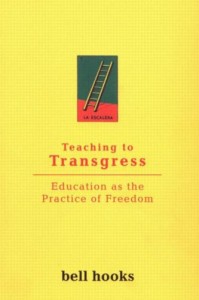
Extremely Good Segue to Freire, January 7, 2008
This is the third of three books on liberation pedagogy that I picked up, the other two being Pedagogy of Freedom: Ethics, Democracy, and Civic Courage (Critical Perspectives Series) and Pedagogy of the Oppressed.
This book is a collection of essays by a woman of color who studied with Freire and found in his works her own liberation and her inspiration to take his ideas and practices further.
I am shocked early on to realize that her description of black schools prior to desegregation as better, because their teachers were passionate about helping them excel, whereas in integrated schools they were treated as second class citizens and taught obedience, rings true.
I see feminist pedagogy in a new more positive light.
The author represents a unique interplay among anticolonial, critical, and feminist pedagogies.
She resonates with me when she speaks of the crisis in education; of our need for a totally renewed educational environment in which biases must be confronted and students liberated.
Her strong statement that education should be the practice of freedom is repeated in many different ways throughout the book.
She states, and I have three sons in public school who would agree, that transgressing wrong-headed boundaries is liberating and entirely called for. She discusses teachers as healers, and throughout this book I gain a deeper broader sense of the pain that minorities and women take pains to repress or conceal because the educational environment is not safe for revelation, only obedience.
I am quite taken by her discussion of the importance of wholeness in teaching, and her engaging discussion of how many professors, especially white mailes, are social misfits who think they can separate their teaching (one-way, authoritarian) without having to engage with students of be whole themselves. She is especially hard on the manner in which they treat the classroom as personal fiefdoms where they can exercise unchallenged authority.
She says that resistance must include the unconvering of lost knowledge. I am reminded of Fog Facts: Searching for Truth in the Land of Spin and Lost History: Contras, Cocaine, the Press & ‘Project Truth'.
She quotes Martin Luther King in emphasizing, as he did, that shared values and a focus on people are essential is we are to contain, in his words, “the giant triplets of racism, materialism, and militarism.”
She teaches that cultural diversity is INCLUSIVE, and it is not about substituting one culture over another in the relation pecking order. I am reminded of two books I recently reviewed, The Web of Inclusion: Architecture for Building Great Organizations and The Difference: How the Power of Diversity Creates Better Groups, Firms, Schools, and Societies.
She states that teaching that does not include explicit awareness of race, sex, or class, lacks liberating context.
She cites Terry Eagleton who says “Children make the best theorists,” for not being indoctrinated, and I am reminded of how many arguments I have lost to my 18-year-old when “because I say so” just does not suffice.
I am fascinated by her discussion of how standards can suppresses, norms can neutralize.
She spends time on the importance of theory as a space, a place, for sense-making and reconciliation.
She cites Full in noting that the boundaries between insiders and outsiders contain information rather than allowing the dissemination of knowledge. I am reminded of The Pathology of Power – A Challenge to Human Freedom and Safety.
The author offers a very effective critique of the ignorance, stereotyping, and lack of understanding with which white professors wrote about black reality.
I am not doing justice to the essays on existentialism and on black-white women in relation and in critique of one another, but she notes that resolution between them demands joint collective dialog.
As the book of essays winds down I have a few notes:
+ Habit versus voice
+ Must teach students how to LISTEN
+ Being a teacher is about BEING with people
+ Pedagogy can be, should be, political activism
+ Queens in New York City has 17,000 people speaking 66 languages
+ Class matters, and is too often left unaddressed. I am reminded of Global Class War
Her final note: Learning is a place where paradise can be created. We must learn to transgress freely, and thereby demonstrate that education IS freedom. I am reminded of Improper behavior.
I would not have appreciated this book and the author's insights as easily had I not first read t he two works by Friere that I cite above. The author honors and exceeds her model, this is a very fine book, and I would add in passing that I also found Cornell West's Democracy Matters: Winning the Fight Against Imperialism to be a Nobel-level reflection.
Very highly recommended.
Also recommended:
Radical Man: The Process of Psycho-Social Development.



